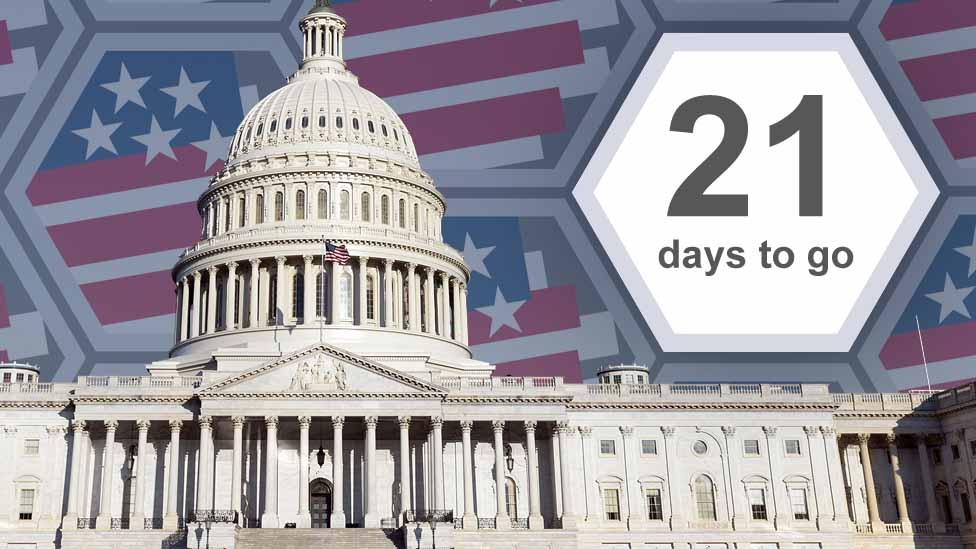Your US mid-term elections daily digest
- Published

The US mid-term elections in three weeks' time will help define the rest of Donald Trump's presidency.
Americans will vote for members of both chambers of Congress, as well as for governors in 36 out of 50 states.
Between now and then, we'll bring you updates and all the best analysis every weekday in this round-up.
Today's round-up includes a plethora of Pelosis and blowback for a possible candidate.
One number

If the Democrats win control of the House of Representatives, as they are hopeful of doing, Nancy Pelosi is likely to return to her role as Speaker, essentially becoming the most powerful Democrat in office.
The move wouldn't be popular with all Democrats. Many feel she may not be the best person to usher in a new era for the party, and have said they would not vote for her as leader.
And it would certainly not be popular on the other side of the aisle - the president himself has called her "the unhinged face of the Democrat Party".
Pelosi's name was brought up so often in one debate on Monday, you would have thought she was the one running for the House seat in Virginia's seventh district.
Republican incumbent Dave Brat mentioned Pelosi's name 21 times in a little more than 80 minutes, trying to link challenger Abigail Spanberger to what he called Pelosi's "agenda of Resist".
At the sixth reference, members of the audience began chuckling. By the seventh, the laughing was so loud it interrupted Brat's answer (watch from the half-hour mark here, external).

Dave Brat and Nancy Pe... sorry, Abigail Spanberger, debate in Culpeper, Virginia, on Monday
The use of "Pelosi" as a byword for liberal values has been a trend among Republicans this year - Politico found that ads attacking her or Hillary Clinton had aired 34,000 times this year, external.
Among the regular accusations in the ads are that Pelosi supports sanctuary cities for migrants, and wants to raise taxes.
This was Brat's line of attack on Monday night too. His district is one Democrats hope to flip, and even though Brat won 60.8% of the vote in 2014, it is too close to call this year.
One controversy
On Monday, we brought you the news that Elizabeth Warren, the Massachusetts Democratic senator who's up for re-election, had appeared to launch a 2020 presidential campaign with this video:

Warren's seat is one of the safest in the country, so it's perhaps understandable that she's looking beyond the mid-terms.
Not everyone is seeing it that way though, and she's faced quite a bit of flak for what some say is a distraction for Democrats before the mid-terms.
Jim Messina, Barack Obama's former campaign chief, was one to weigh in:
Allow X content?
This article contains content provided by X. We ask for your permission before anything is loaded, as they may be using cookies and other technologies. You may want to read X’s cookie policy, external and privacy policy, external before accepting. To view this content choose ‘accept and continue’.
Maybe it would have been better for her to do the respectful thing like everyone else and wait until the morning after the mid-terms before launching her presidential campaign.
One game
Whatever happens in Congress on 6 November will have profound consequences on the next two years in the US.
We've put together this little experiment to try and show what those consequences might be - and to give you a sense of how different parties will view the mid-terms.
- Published15 October 2018
